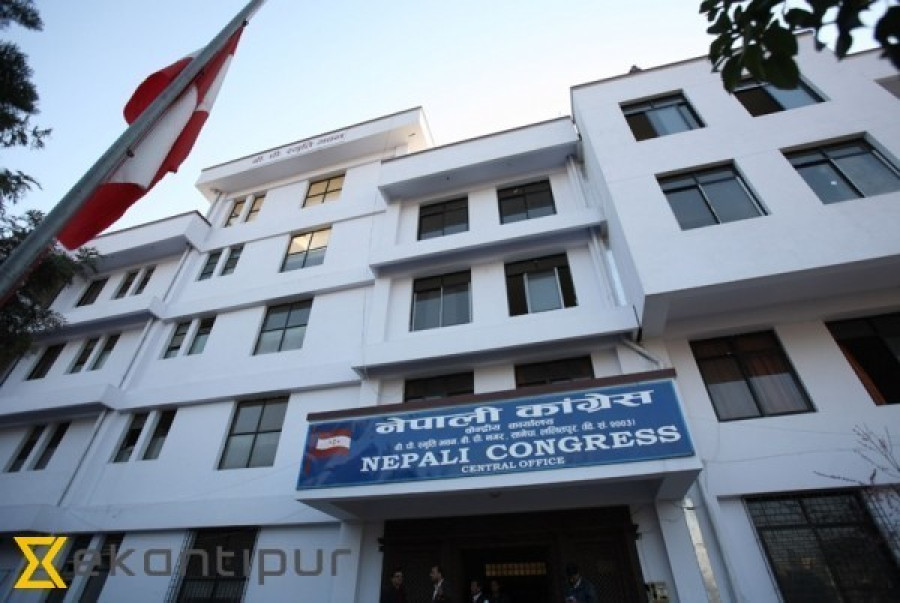National
Congress leaders blame factionalism for delay to form party departments
Three years after its 13th General Convention, the Nepali Congress leadership is yet to constitute party departments—a total of 42—which the party statute considers as “mini think tanks”.
Three years after its 13th General Convention, the Nepali Congress leadership is yet to constitute party departments—a total of 42—which the party statute considers as “mini think tanks”.
These 42 party departments, as envisioned by the previous party statute, are supposed to advise the party leadership and the Central Working Committee on issues ranging from national politics to governance to foreign policy to the role the party should be playing in Parliament.
Congress leaders told the Post that intra-party squabbling was the main reason for the failure to institute the party departments.
“We have raised this issue several times in the Central Working Committee. This should have been done much earlier,” said Arjun Narsingh KC, a central member of the party. “We do not know why the party president is reluctant to complete them.”
The Congress party in 2017 faced its biggest ever election debacle. With 63 seats in the 275-member House of Representatives, the party sits on the opposition bench.
Congress leaders told the Post that in the absence of departments, the party is failing to get the direction while its performance in the the House has also been dismal.
A senior leader, who did not want to be quoted on the party’s internal matters, told the Post that the NC was grappling with factionism and that this was the main reason for all the mess.
There are at least three factions in the party—one led by party President Sher Bahadur Deuba, another led by Ram Chandra Poudel and the third by Krishna Prasad Sitaula.
Immediately after last year’s election debacle, the Poudel faction had categorically named the lack of departments as one of the major reasons for the poor performance. Poudel had then said internal democracy in the party had weakened and that since key positions (vice president, general secretary, and joint general secretary) were vacant, the NC was nowhere close to “becoming a complete party”.
The Poudel faction holds Deuba responsible for the absence of departments years after the general convention.
However, Deuba supporters refuted the charges saying that factionalism was to blame—not the party president—for the delay in the appointment of officials and the party departments getting their full shape.
“We will give shape to all the remaining organisations and structures once the Central Working Committee endorses the new party charter,” said Purna Bahadur Khadka, the general secretary considered close to Deuba.
The Mahasamiti meeting held in December last year agreed on a new party charter, which is yet to be endorsed by the central committee.
After approving it, the party has to formulate regulations for making appointments and assigning their mandates.
According to Article 37 of the party charter, the central body will form central departments and each of them will be headed by a CWC member. The charter also defines their works, duties and rights.
Since its March 2016 general convention to date, the party has held dozens of central committee meetings and one Mahasamiti meeting but both the statutory bodies have failed to take up the issue of completing these crucial departments.
“We are tired of raising this agenda at the party meetings,” said KC.
Earlier, the party had plans to form at least 42 departments. The number has now been brought down to 28 at the central level while the party statute envisions 22 new departments in the provinces.
As per the party charter, each department will have a maximum of 51 members and in consultation with the party president, each department head will appoint one deputy head, one secretary and members.
Those picked for the posts of deputy, secretary and members shall be party members but selection will be made following the principle of inclusion from various clusters—women, Dalits, Janajatis, underprivileged groups, backward communities and remote regions.
The areas of interest, specialisation and expertise, experience and contribution to the party will be taken into account in the selection process, the party charter says.
Any department can form separate cells or subcommittees or working groups involving experts in order to advise the party leadership.




 22.59°C Kathmandu
22.59°C Kathmandu














